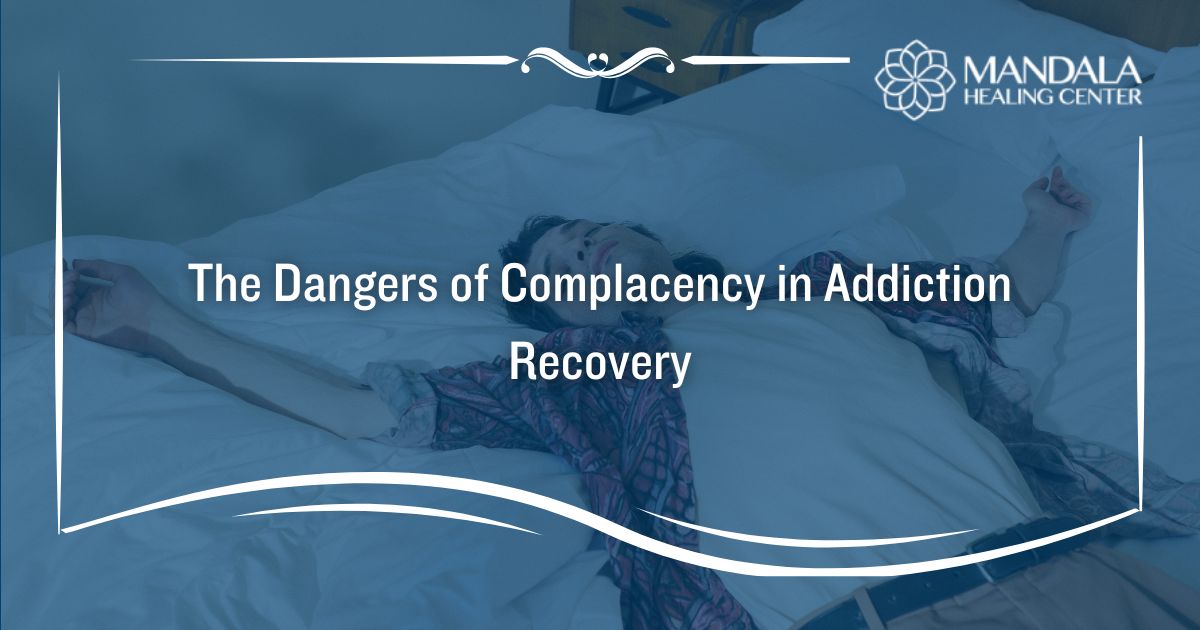Recovery from addiction can be a long road. You might have to complete detox, inpatient treatment, and outpatient rehab. Unfortunately, even when you finish addiction treatment, your work is not done.
To remain sober long-term, you have to continue working at bettering yourself and reinforcing your recovery each day. This might look like attending daily support groups, going to therapy regularly, and engaging with a recovery community in your social life. In other words, recovery is a daily and lifelong process that you have to continuously choose.
Complacency is a term that describes feeling self-satisfaction with your achievements. While at first glance this sounds positive, it actually prevents you from making further progress. It is possible to become complacent in recovery.
Complacency in recovery might look like skipping meetings, isolating from your support network, or feeling like you are “recovered enough” to end therapy. Sadly, this state of mind can quickly lead to a relapse.
To ensure you remain sober, you’ll need to know how to avoid complacency. The best tips for avoiding this phenomenon are engaging in self-reflection, challenging flawed thinking, changing your routines, and remembering the consequences of substance abuse.
In this article, you will learn:
- What complacency means
- Signs of complacency in sobriety
- The risk of complacency in recovery
- How to avoid complacency
What Does it Mean to Be Complacent?
The term “complacent” refers to a state of mind where you feel so satisfied with your achievements that you think you do not need to try any harder. While you can recognize your hard work, you should not allow yourself to feel like you cannot get any better.
Instead of believing there is room for improvement, complacency causes you to become unaware of areas where you could enhance yourself. It also makes you unaware of potential dangers or negative outcomes that could occur without improvement. As a result, you fail to push yourself and eventually experience adverse effects or a worsening of your situation.
Complacency can occur in a variety of situations. You could become complacent in school, thinking there is no room for additional academic improvement. On the other hand, you could become complacent in your life as a whole, preventing yourself from becoming more physically and mentally healthy.
Signs of Complacency in Recovery
Complacency can also relate to recovery. If you find yourself thinking your work is done after you’ve graduated from a recovery program, you might be experiencing complacency.
The signs of complacency in addiction recovery include:
- Participating less during sober support meetings
- Ending your attendance of meetings altogether
- Lessening or stopping your therapy
- Failing to reach out to sober support friends or sponsors
- Not interacting or hanging out with your recovery support network
- Feeling like you have completed recovery after finishing working the steps
- Not engaging in a gratitude journal or paying attention to triggers
- Allowing negative emotions to overwhelm you instead of working on them
- Engaging in high-risk situations like going to parties where alcohol and drug use will occur
- Overconfidence in your recovery and dismissing warning signs of relapse
Why is Complacency in Recovery Dangerous?
Complacency can make it difficult to stay sober. When you are in your recovery journey, the only way to stay healthy is to keep improving. Becoming complacent will prevent you from experiencing any further growth.
Experiencing complacency in recovery can lead to increased mental health symptoms, negative emotions, failure to engage in relapse prevention techniques, and more. All of these effects can put you one step closer to experiencing a relapse.
Successful recovery requires you to continue working on improving in all areas of your life. This means you cannot become complacent. Instead, you need to continue engaging in the techniques that helped you get sober in the first place. Additionally, you cannot fail to stay connected with a support network that can help you stay on track.
How to Avoid Complacency
Avoiding complacency can be difficult. After all, you want to feel like you have accomplished your goals and fully recovered. While you can acknowledge your achievements, you also have to recognize that there is always room for growth.
Tips for avoiding complacency in addiction recovery include:
- Self-Reflection – Reflecting on your behaviors in recovery can help you identify areas where you can improve. By doing this, you give yourself something new to work on and prevent complacency from taking place.
- Challenging Flawed Thinking – Complacency is often caused by some sort of flaw in thinking. You might believe you have cured your addiction or feel you are too smart for a relapse to occur. Challenging thoughts like these will prevent complacency from beginning.
- Changing Routines – Complacency can be caused by boredom. Maybe you have stuck to the same routine for some time and are feeling boxed in. If so, you can avoid becoming complacent by making some changes to your daily routines.
- Playing the Tape Through – Complacency can begin when you forget how your substance abuse negatively impacted your life. Instead, make sure to keep the consequences of addiction in the forefront of your mind. This will ensure that you feel motivated to continue bettering yourself.
Find Help for Drug and Alcohol Abuse
If you or a loved one suffers from addiction, it’s time to seek professional help. Addiction treatment centers can offer the tools and support you need to achieve long-term recovery. We can also teach you how to avoid complacency once you complete our program.
The Mandala Healing Center is here to help you recover. Contact us today for more information on how to get started.












